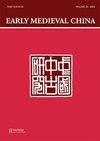Editor's Note
IF 0.3
4区 社会学
0 ASIAN STUDIES
引用次数: 0
Abstract
This issue marks the formal transition in the editorship of Early Medieval China. In keeping with the tradition, I as the new editor wish to pay tribute to the former editors of the journal: Victor Cunrui Xiong (Vols. 1–5, 1994–1999), Cynthia Chennault (Vols. 6–16, 2000–2010), and J. Michael Farmer (Vols. 17– 26, 2011–2019), as well as Matthew Wells who served as Assistant Editor in the last few years of Michael Farmer’s tenure. They made great efforts and did excellent work to nurture and guide this journal, which today still remains the only journal in the English language dedicated to the study of the historical period known as early medieval China. It is a privilege and honor for me to take up the torch. In 1994 Dennis Grafflin, then President of the Early Medieval China Group, wrote the “Foreword” for the inaugural issue of Early Medieval China. It was spelled as “Forward” in the issue, and the pun turned out to be prophetic, as the field has indeed moved forward enormously since three decades ago. In archeology, art, history, literature, and religious studies, we have seen manymonographs, edited volumes, articles, doctoral dissertations, master’s theses, translations, conferences, workshops, and exhibitions. We also witness a much-improved gender balance, as there are more woman scholars who are active and visible in the field. All these developments have contributed to the vibrancy, diversity, and richness of the larger field of medieval China studies. This issue, featuring articles and book reviews by veterans of the field, mid-career scholars, and scholars of the younger generation, showcases the continuing growth of the field. Meow Hui Goh addresses the concerns about deception, sincerity, voice, and affect in literary writings by examining three cases of fabricating letters as a war strategy; Qiaomei Tang explores the high political stakes of a thorny legal and ritual problem of “two principal wives” under shifting geopolitical conditions; Charles Holcombe analyzes group identity formation and perception in the interactions of Chinese and non-Chinese peoples in the borderland; and Lu Kou discusses the politics of court music and the creation of an “audible empire” in the early years of the Sui dynasty. Together, the articles consider questions of ethnicity, identity, legitimacy, and the meaning and significance of wen in dynastic transition and empire building. They attest to the importance of paying close attention to primary sources that cut across modern disciplinary divisions and envisioning history in its totality of contemporary beliefs and social conditions beyond its textual traces. I came from an editor’s family; my father had edited a literature journal for many years. Yet, only after working as an editor myself did I realize the amount of work and care going into a journal issue. It is also teamwork: I thank our new social media editor, the Editorial Board, and the EMCG President, Treasurer, and Board of Directors for their support; I am grateful to the scholars who served as reviewers of manuscripts, and to Geraldine Richards and Melanie Porter at Taylor & Francis Group for their assistance. Finally, it is to you, Early Medieval China, 28, 1–2, 2022编者按
这一期标志着《中古早期中国》编辑的正式转变。按照传统,我作为新主编希望向杂志的前任编辑致敬:Victor Cunrui Xiong (vol . 1, 1994-1999), Cynthia Chennault (vol . 6, 2000-2010)和J. Michael Farmer (vol . 17 - 26, 2011-2019),以及Matthew Wells,他在Michael Farmer任期的最后几年担任助理编辑。他们付出了巨大的努力,做了出色的工作来培育和指导这本杂志,今天它仍然是唯一一本致力于研究中世纪早期中国历史时期的英文杂志。对我来说,拿起火炬是一种荣幸。1994年,时任中世纪早期中国小组主席的丹尼斯·格拉夫林为《中世纪早期中国》创刊号撰写了“前言”。在这期杂志中,它被拼写为“Forward”,这个双关语被证明是预言性的,因为自30年前以来,这个领域确实取得了巨大的进步。在考古、艺术、历史、文学和宗教研究领域,我们看到了许多专著、编辑卷、文章、博士论文、硕士论文、翻译、会议、研讨会和展览。我们也见证了性别平衡的大大改善,因为有更多的女性学者在这个领域活跃和引人注目。所有这些发展都促进了中世纪中国研究领域的活力、多样性和丰富性。这一期的文章和书评由该领域的资深学者、处于职业生涯中期的学者和年轻一代的学者撰写,展示了该领域的持续发展。《猫慧高》通过对三起伪造信件作为战争策略的案例,探讨了文学作品中对欺骗、真诚、声音和情感的关注;唐乔梅探讨了地缘政治条件变化下“两个主要妻子”这一棘手的法律和仪式问题的高度政治风险;Charles Holcombe分析了边境地区华人与非华人互动中的群体认同形成与感知;吕寇则讨论了隋朝早期宫廷音乐的政治和“听觉帝国”的建立。这些文章一起考虑了种族、身份、合法性以及在王朝过渡和帝国建设中的意义和重要性等问题。它们证明了密切关注跨越现代学科划分的原始资料的重要性,以及超越文本痕迹以当代信仰和社会条件的整体来设想历史。我来自一个编辑的家庭;我父亲曾编辑一本文学杂志多年。然而,只有当我自己成为一名编辑之后,我才意识到期刊发行的工作量和细心程度。这也是团队合作的结果:我感谢我们新的社交媒体编辑、编辑委员会以及EMCG总裁、财务主管和董事会的支持;我要感谢担任手稿审稿人的学者,以及泰勒和弗朗西斯集团的杰拉尔丁·理查兹和梅勒妮·波特的帮助。最后是给你的,《中世纪早期的中国》,2022年第28期,1-2期
本文章由计算机程序翻译,如有差异,请以英文原文为准。
求助全文
约1分钟内获得全文
求助全文

 求助内容:
求助内容: 应助结果提醒方式:
应助结果提醒方式:


